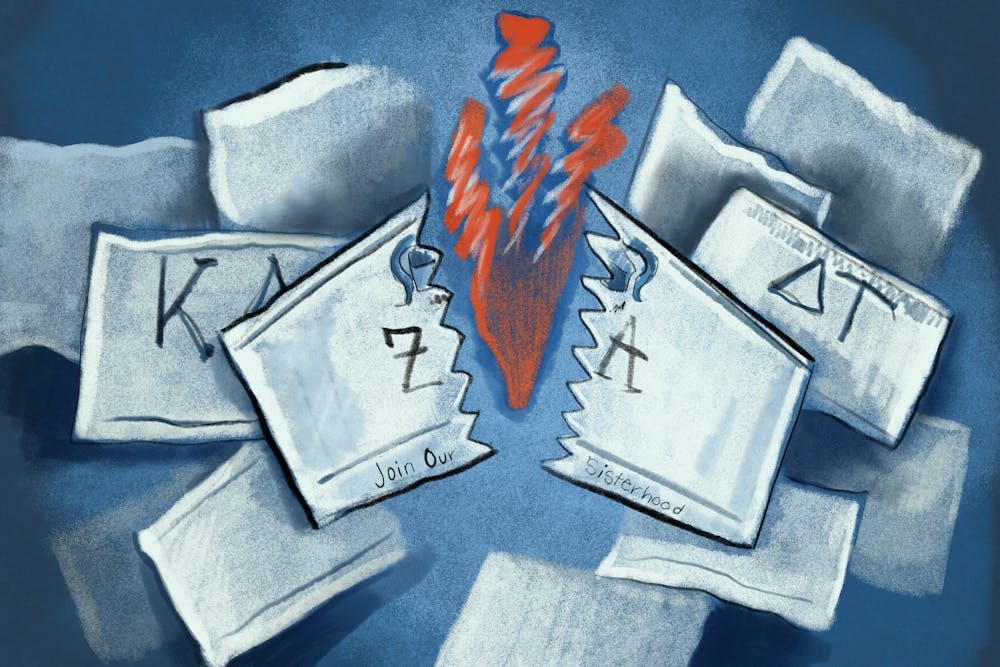In the sweltering summer heat, thousands of girls gather at USC’s Greek Village to begin the long Panhellenic sorority recruitment process. Recruitment, also known as rush, kicks off the beginning of the fall semester. For some, it even kicks off the start of finding a lifelong sisterhood.
Even though many girls have gone through rush and found the chapter of their dreams, this may not be everyone's experience. Sorority recruitment is hard — and in many ways flawed by a preexisting context of superiority.
Recruitment is an endless cycle of being in and out of different houses, constantly trying to form connections and finding the answer to a paramount question: where does one feel like they most belong?
In reality, there is more to it.
At USC, recruitment consists of four rounds: Go Greek, Philanthropy, Sisterhood and Preference. These rounds provide the opportunity for potential new members, or PNMs, to meet different girls in each chapter. As the rounds progress, they also get longer and the conversations get deeper.
On paper, the process may seem easy. But after looking at the way recruitment is designed it begs the question: is rush really that simple?
The first round at USC, Go Greek, involves a video submission from each PNM. Every chapter may have a different method for reviewing these videos and determining who gets invited back. Not every girl who submits one of these five minute videos is guaranteed a spot in the next round.
The process allows girls to be dropped from chapters and even the entirety of recruitment itself without ever stepping foot into any of the houses. This may leave PNMs feeling dejected from the process altogether. Girls may feel insecure or even like they weren’t enough. There is nothing that these PNMs can do but trust that, as the recruitment counselors say, “you'll end up where you're meant to be.”

During the different rounds of recruitment, PNMs are essentially “ranked” on different systems depending on a specific chapter. The sorority I used to be in ranked girls in certain categories, such as ambition, respect and connectivity. It may be disingenuous to score girls based on surface level conversations, especially considering it is extremely difficult to form a connection with a stranger in 15 minutes.
Moreover, there is a prevelant thought that some sororities are better than others. For some PNMs, it may not be about finding where they feel like they most belong, but joining a chapter that they believe is the “best” on campus.
This is evident on the site, Greekrank, where users can anonymously leave reviews and ratings on chapters on college campuses. Chapters are rated based on these stats, which are self-reported by anyone with access to the internet.
However, not all of these comments are true and can negatively impacting a chapter’s reputation. PNMs may read what is being written about USC’s sororities and base their judgements off of these reviews. Other social media posts may also factor into this, especially considering the rise of “Rushtok.”
The idea of a chapter being “better” than another chapter can be found in campus culture as well, not just on the internet. When I was in a sorority, we would always hear the term “Panhel love.” This means that even though there are 13 different chapters at USC, everyone is united under the umbrella of Panhellenic sorority life.
Although, this isn't always true.
What happens during rush isn’t really talked about. My experience as a PNM and my experience as a recruiter were very different things. I had no idea what I was getting myself into as an out-of-state student new to Southern Greek life and USC in general. As a recruiter, I witnessed PNMs being rude on purpose so that they did not get invited back to my chapter during the next round. I found this to be a common “strategy” among girls so that they would only get invited back to the “top” houses.
This whole idea that some chapters may be better than others during recruitment creates a large divide in Panhellenic Greek life. It creates a flawed narrative of superiority, which may even ruin the entire recruitment process for some PNMs.
The recruitment process needs reform, especially as rush at USC gets larger every year. To practice the sisterhood that Panhellenic is preaching changes need to be made to recruitment, including eliminating the virtual round, bridging the divide between chapters and making a fair and consistent score process across all of USC Panhellenic.
The flaws in recruitment are oftentimes ignored, leaving many PNMs wondering what they did wrong. Yet, it isn't a reflection of the individual but of the organization as a whole.
Rush is supposed to be the first step in the college experience for many girls just arriving at USC. It should be fun, positive and a great way to meet new people. Due to the flaws that lie within recruitment itself, this may not be the experience for every girl.
The girls PNMs meet during rush are meant to be their lifelong sisters and it's heartbreaking to see an emphasis on superiority rather than genuine connections.

